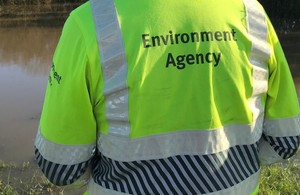Consultation launched on unlimited fines for the worst polluters
The Environment Agency launches eight-week consultation on changes to variable monetary penalties.

- The Environment Agency launches eight-week consultationon changes to variable monetary penalties.
- Changes will scrap the £250,000 cap on civil penalties and significantly broaden their scope to target a wider range of environmental offences.
- New enforcement powers will allow the Environment Agency to apply penalties that are quicker and easier to enforce.
The Environment Agency has today (15 August) launched a consultation on changes to variable monetary penalties – financial penalties that can be imposed for certain environmental offences.
The consultation will run for eight weeks and will close on 8 October. The consultation seeks views on when penalties are used, how they are calculated and the appeals process.
This follows the government announcing that it will lift the current limit of £250,000 that the Environment Agency can impose directly on operators, as well as expanding variable monetary penalties to cover more offences under the Environmental Permitting (England and Wales) Regulations 2016.
This offers regulators a quicker method of enforcement than lengthy and costly criminal prosecutions – although the most serious cases will continue to be taken through criminal proceedings.
The changes will ensure regulators have the right tools to drive compliance across a range of sectors, strengthening enforcement and holding all who hold environmental permits to greater account – from energy and water companies to waste operators and incinerators.
All future environmental fines and penalties from water companies will be put into a new Water Restoration Fund, which will be re-invested back into the environment by supporting local groups and community-led schemes.
Environment Agency Executive Director John Leyland said:
These new enforcement powers will be an extra tool in our armoury to hold polluters to account.
They will act as a further deterrent - boosting compliance across a range of sectors and helping us provide stronger protection to the environment, communities and nature.
Minister for Environmental Quality and Resilience Rebecca Pow said:
Polluters must always pay – by lifting the cap on these sanctions, we are simultaneously toughening our enforcement tools and expanding where regulators can use them.
This consultation builds on government action to increase investment, toughen enforcement and tighten regulation and will make sure there is a proportionate punishment for operators that breach their permits and harm our rivers, seas and precious habitats.
There are clear provisions in the Sentencing Council guidelines that will ensure the level of penalties levied are proportionate to the degree of environmental harm and culpability. These include safeguards to ensure the operator’s ability to pay, the size of the operators, and the degree of responsibility and harm, amongst others – all of which are taken into account when imposing a penalty. The penalties will only be applied where it is shown beyond reasonable doubt that an offence has occurred.
Notes to editors:
- The Environment Agency has launched this consultation because, following the government confirming the changes, the Environment Agency will amend its Enforcement and Sanctions Policy to provide detail on how the new powers will be used and how the penalties will be calculated. The Environment Agency is legally required to consult on proposed changes to their policy and give greater clarity to those who may be affected by them.